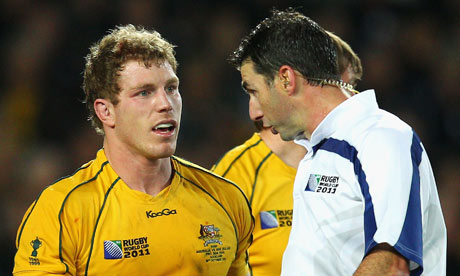
A prominent South African last week urged the International Rugby Board to launch an investigation, to see whether the New Zealand referee Bryce Lawrence should be charged with match-fixing. Lawrence allegedly allowed the Australia flanker David Pocock to get away with all sorts of illegalities at the breakdown in the quarter-final against the Springboks.
A South African referee, Craig Joubert, was less tolerant of Pocock's penchant for slowing down opposition ball in the semi-final against New Zealand on Sunday night. The All Blacks' kicker, Piri Weepu, twice found himself lining up penalties in the first 12 minutes, after the flanker had been penalised for going off his feet.
It was almost a replay of the opening minutes of New Zealand's 2007 World Cup quarter-final against France, when Richie McCaw, who had been accused of cheating at the breakdown in the build‑up, was penalised twice and had to modify his approach.
The All Blacks knew on Sunday night that, like South Africa, they would have an advantage in the tight five. It was a matter of containing Pocock – their ploy was to force the flanker to make a tackle and then to clear out the ruck when he was still on the floor. Pocock was rarely able to slow down New Zealand's ball and the Wallabies were on the back foot from the start. When they did earn some respite and made their way upfield, McCaw was penalised at a ruck and James O'Connor kicked the three points after Pocock had ruffled the hair of his opposite number.
"Keep your head, David, keep your head," said Joubert, but Australia were heading out. There had been speculation that McCaw was struggling with a foot injury and that the semi-final would see him bequeath his title of master of the breakdown to Pocock. In the event the handover was postponed, as the New Zealand captain gave one of the performances of his distinguished career.
"We were not able to slow down their ball as much as we would have liked," said Pocock. "I do not want to comment on the referee. He did his best. I personally found it a very frustrating game, but we did not lose because of what happened at the breakdown. New Zealand were better than us on a night when they showed real quality."
Flankers in the mould of Pocock and McCaw test the tolerance of referees to the full, looking from the off to see what they will be able to get away with. It was a case of almost anything for Pocock against South Africa, but nowhere near as much against New Zealand.
"The breakdown is a big part of the game and it is something you have to deal with," said Pocock. "Some referees have taken a lot of flak in the media during the World Cup, but in fairness to them I think they have done a good job across the board. They have been pretty consistent."
The New Zealand coach, Graham Henry, said the All Blacks had devised a plan to contain Pocock and the blindside Jerome Kaino, who rarely wasted an opportunity to give the 23-year old his advice, said the neutralisation of the Wallaby was a reason that a night that had been expected to be tight and tense was almost stress-free.
"Pocock was the man in their pack we knew we had to contain," said Kaino. "We made sure that we ran at him at every opportunity and it paid off. We kept him away from our ball for a lot of the time and it allowed us to play at our own pace."
So the hosts of 2007 will meet the hosts of 2011 in Sunday's final. It looks safe to assume that there will be no repeat of the All Blacks' complaints about the refereeing in Cardiff four years ago when, despite constant pressure in the second-half, they were not awarded one penalty.
Here, it was not until the 76th minute, when Sonny Bill Williams was sent to the sin-bin, that Australia won a penalty in the second-half. Hosts often get a good break from referees – good news for England in 2015.

